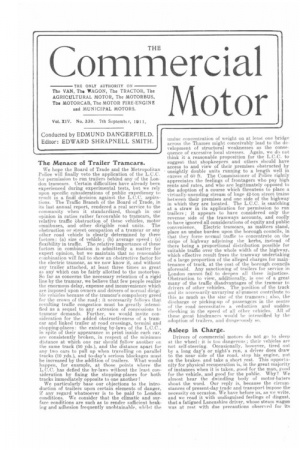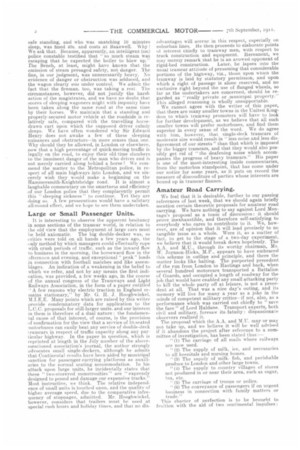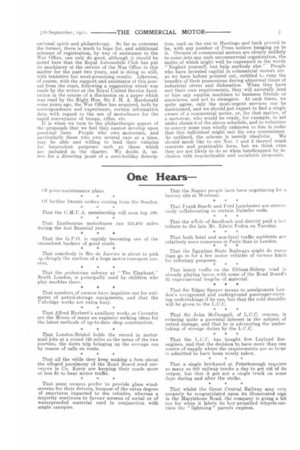The Menace of Trailer Tramcars.
Page 1

Page 2

Page 3

If you've noticed an error in this article please click here to report it so we can fix it.
We hope the Board of Trade and the Metropolitan Police will finally veto the application of the L.C.C. for permission to run trailers behind any of the London tramcars. Certain difficulties have already been experienced during experimental tests, but we rely upon specific considerations of public expediency to result in a finA1 decision against the L.C.C. aspirations. The Traffic Branch of the Board of Trade, in its last annual report, rendered a real service to the community when it standardized, though in our opinion in ratios rather favourable to tramcars, the relative traffic bbstruction of these vehicles, motor omnibuses, and other dirigible road units. The obstruction or street occupation of a tramcar or any other road vehicle is clearly determined by three factors: (a) size of vehicle ; (b) average speed ; (c) flexibility in traffic. The relative importance of these factors in combination is admittedly a matter for expert opinion, but we maintain that no reasonable combination will fail to show an obstructive factor for the electric tramcar, as we now know it, and without any trailer attached, at least three times as great as an/ which can be fairly allotted to the motorbus. So far as concerns the necessary retention of a rigid line by the tramcar, we believe that few people realize the enormous delay, expense and inconvenience which are imposed upon owners and drivers of normal dirigible vehicles because of the tramcar's compulsory greed for the crown of the road; it necessarily follows that resulting traffic congestion must be. greatly intensified as a sequel to any extension of concessions to tramcar demands. Further, we would invite consideration for the added obstructiveness of a tramcar and linked trailer at road crossings, termini and stopping-places : the existing by-laws of the L.C.C., in spite of their appearance in print inside each car, are consistently broken, in respect of the minimum distance at which one car should follow another on the same track (50 yds.), and the distance apart for any two cars to pull up when travelling on parallel tracks (10 yds.), and to-day's serious blockages must be increased by the addition of trailers. What would happen, for example, at those 'Joints where the L.C.C. has defied the by-laws without the least consideration by fixing the stopping-places for both tracks immediately opposite to one another I We particularly base our objections to the introduction of trailers upon certain elements of danger, if any regard whatsoever is to be paid to London conditions. We consider that the climatic and surface conditions are such as to render sufficient braking and adhesion frequently unobtainable, whilst the
undue concentration of weight on at least one bridge across the Thames might conceivably lead to the development of structural weaknesses as the consequence of excessive local stresses. Again, we do not think it a reasonable proposition for the L.C.C. to suggest that shopkeepers. and others should have access to and view of their premises obstructed by unsightly double units running to a length well in excess of 60 ft. The Commissioner of Police rightly appreciates the feelings of frontagers who pay high rents and rates, and who are legitimately opposed to the adoption of a course which threatens to place a virtually-unending stream of huge 42-ton street trains between their premises and one side of the highway in which they are located. The L.C.C. is snatching at a straw in its application for permission to run trailers ; it appears to have considered only the revenue side of the tramways accounts, and coolly to have ignored all considerations of equity and public
convenience. Electric tramcars, as matters stand, place an undue burden upon the borough councils, in that they force normal traffic to concentrate on the strips of highway adjoining the kerbs, instead of there being a proportional distribution possible for suitable traffic over the whole width of the highway, which effective result frees the tramway undertaking of a large proportion of the alleged charges for maintenance of track, at the cost of the borough councils aforesaid. Any sanctioning of trailers for service in London cannot fail to deepen all these injustices. Obstruction to view, additionally, is one of a great many of the traffic disadvantages of the tramcar to drivers of other vehicles. The position of the track and its necessarily-unvarying alignment contribute to this as much as the size of the tramcars; also, the discharge or picking-up of passengers in the centre of the road necessitates a reduction and sudden checking in the speed of all other vehicles. All of' these great hindrances would he intensified by the adoption of trailers, and dangerously so.
Asleep in Charge.
Drivers of commercial motors do not go to sleep at the wheel : it is too dangerous ; their vehicles are not self-steering. Occasionally, however, tired out. by a long day's or night's run, a driver does draw to the near side of the road, stop his engine, put on the brakes, and take a short rest. This opportunity for physical recuperation is, in the great majority of instances when it is taken, good for the man, good for the vehicle, and good for the public. Why? We almost hear the dwindling body of motor-haters shout the word. Our reply is, because the circumstances of present-day trade and transport impose the necessity on occasion. We have before us, as we write, and we read it with undisguised feelings of disgust, that a fatigued Lancashire driver, whose steam wagon was at rest with due precautions observed for its safe standing, and who was snatching 10 minutes sleep, was fined 40s. and costs at Baaewell. Why ? We ask that. Because, apparently, an intelligent (sic) police constable testified that so much steam was escaping that he expected the boiler to blow up." The Bench, at least, might have known that the emission of steam presaged safety, not danger. The fine, in our judgment, wsis unnecessarily heavy. No evidence of danger or obstruction was adduced, and the wagon clearly was under control. We admit the fact that the fireman, too, was taking a rest. The circumstances, however, did not justify the harsh action of the magistrates, and we have no doubt that scores of sleeping wagoners might with impunity have been taken along the same road at the same time by their horses. We maintain that a standing and properly-secured motor vehicle at the roadside is relatively safe, compared with the travelling horsedrawn cart upon which the supposed driver calmly sleeps. We have often wondered why Sir Edward Henry does not awake a few of these sleeping nuisances and obstructors—in more senses than one. Why should they be allowed, in London or elsewhere, now that a high percentage of quick-moving traffic is legally on the road, to enjoy their old-time slumbers to the imminent danger of the man who drives and is not merely carried along be-hind a horse '? We commend the matter to the Metropolitan police, in respect of all main highways into London, and we sincerely wish they would make a beginning on the Hammersmith-Knightsbridge road. It is almost a laughable commentary on the smartness and efficiency of our London police that they complacently permit this " sleeping sickness" to continue. Yet they are doing so. A few prosecutions would have a salutary
Large or Small Passenger Units.
It is interesting to observe the apparent hesitancy in some sections of the tramcar world, in relation to he old view that the employment of large cars must be held axiomatic. The big double-decker was, so critics were told on all hands a few years ago, the only method by which managers could effectually cope with crush periods of traffic, such as the inward flow to business in the morning, the homeward flow in the afternoon and evening, and exceptional " peak" loads in connection with football matches and like assemblages. An indication of a weakening in the belief to which we refer, and not by any means the first indication, was provided, a few weeks ago, in the course of the annual congress of the Tramways and Light Railways Association, in the form of a paper entitled • 'A few reasons why electric traction in England remains stationary," by Mr. G. H. J. Hooghwinkel, M.I.E.E. Many points which are raised by this writer provide condemnatory data for application to the L.C.C. proposals for still-larger units, and our interest in them is therefore of a dual nature : the fundamental cause of that interest, of course, is the provision of confirmation for the view that a service of 31-seated .notorhuses can easily beat any service of double-deck iramcars in respect of traffic capacity along any particular highway. In the paper in question, which is reprinted at length in the July number of the abovementioned association's journal, the author strongly advocates small single-deckers, although he admits that Continental results have been aided by municipal sa,nation for passenger-carrying platforms as auxiliaries to the normal seating accommodation. In his attack upon large units, he incidentally states that these "two-storeyed monstrosities" are " expressly designed to pound and damage our expensive tracks." Most instructive, we think. The relative independence of small units is touched upon, and the quality of higher average speed, due to the comparative infrequency of stoppages, admitted. Mr. Hooghwinkel, however, considers that trailers must be used at special rush hours and holiday times, and that no clis advantages will accrue in this respect, especially on suburban lines. ale then proceeds to elaborate points ot interest chiefly to tramway men, with respect to track construction and equipment. Hereanent, we may merely remark that he is an avowed opponent of rigid-bed construction. Later,. he lapses into the usual tramcar attitude of presuming that considerable portions of the highway, viz., those upon which the tramway is laid by statutory permission, and upon which a right of passage is alone reserved, and no exclusive right beyond the use of flanged wheels, so far as the undertakers are concerned, should be regarded as " really private or ,municipal property." This alleged reasoning is wholly unsupportable. We cannot agree with the writer of this paper, that there are many smaller towns in the United Kingdom to which tramway promoters will have to look for further development, as we believe that all such smaller towns will prefer motorbuses, and find them superior in every sense of the word. We do agree with him, however, that single-deck tramcars of moderate size would result in less noise and less disfigurement of our streets" than that which is imposed by the bigger tramcars, and that they would also possibly get rid of "the deafening noise which accompanies the progress of heavy tramcars," His paper is one of the most-interesting inside commentaries, from the motorbus standpoint, that has come under our notice for some years, as it puts on record the measure of discomfiture of parties whose interests are bound up in tramcar finance.
Amateur Road Carrying.
We feel that it is desirable, further to our passing references of last week, that we should again briefly mention certain theoretic proposals for amateur road carrying. We have nothing to say against Lord Montagu's proposal as a topic of discussion : it should prove inexhaustible, and therefore self-satisfying to everybody who cares to contribute to it. We, however, are of opinion that it will lead precisely to no tangible issue as a whole. Were it, as a matter of fact, to get to the stage of a two-day experiment, we believe that it would break down hopelessly. The A.A. and M.U. through its worthy chairman, Mr. W. Joynson-Hicks, M.P., appears to have embraced this scheme in outline and principle, and there the matter looks like halting. The purported precedent of the run from London to Hastings and back, when several hundred motorcars transported a Battalion of Guards, and occupied a length of roadway for the job that would have enabled any small attacking party to kill the whole party off at leisure, is not a precedent at all. That was a nice day's outing, and its memory will live for many a year as a joke in the minds of competent military critics—if not, also, as a performance which was carried out chiefly to "save the face" of Lord Haldane. Transport experts, both civil and military, foresaw its. fatuity : dispassionate observers realized it.
The proposal which the A. A. and M.U. may or may not take up, and we believe it will be well advised if it abandons the project after reference to a committee of investigation, has been stated thus :— " (1) The carriage of all mails where railways are now used.
"(2) The supply of milk, ice, and necessaries to all hospitals and nursing homes. "(3) The supply of milk, fish, and perishable produce to London and other large towns. "(4) The supply to country villages of stores not produced in or near their area, such as sagas, tea, etc. "(5) The carriage of troops or police.
" (6) The conveyance of passengers if on urgent business in connection with family matters or trade."
This charter of perfection is to be brought to fruition with the aid of two sentimental impulses :
national spirit and philanthropy. So far as concerns the former, there is much to hope for, and additional schemes of registration, by way of assistance to the War Office, can only do good, although it should be noted here that the Royal Automobile Club has put its machinery at the service of the War Office in this matter for the past two years, and is doing so still, with tentative but most-promising results. Likewise, of course, with the support and assistance of this journal from the start, following a suggestion which was made by the writer at the Royal United Service Institution in the course of a discussion on a paper which was read by the Right Hon. Sir J. H. A. Macdonald some years ago, the War Office has acquired, both by correspondence and experiment, certain informative data. with regard to the use of motorbuses for the rapid conveyance of troops, rifles, etc.
It is when we turn to the philanthropic aspect of the proposals that we feel they cannot develop upon practical lines. People who own motorcars, and particularly those who own several cars at a time, may be able and willing to lend their vehicles for benevolent purposes such as those which are included in the charter. We doubt it, unless for a diverting jaunt of a semi-holiday deserip time, such as the run to Hastings and back proved to be, with any number of Press notices hanging on to it. Owners of commercial motors are clearly unlikely to come into any such uncommercial organization, the motto of which might well be expressed in the words "Neglect yourself, hut help anybody else." People who have invested capital in commercial motors are. as we have before pointed out, entitled L reap the benefits of their possessions during abnormal times of industrial stress and dislocation. When they have met their own requirements, they will naturally lend or hire any surplus machines to business friends or associates, and not to strangers. At such times, we quite agree, only the most-urgent services can be maintained, and we should not expect to find a single owner of a commercial motor, or, for that matter, of a motorcar, who would be ready, for example, to act under clause 6 of the above schedule, and to volunteer to convey some man wholly unknown to him in order that this individual might suit his own convenience. As outlined, the scheme is merely idealistic. We should much like to see Nos, I and 2 thereof reach concrete and practicable form, but we think even they are not likely to do so when handicapped by inclusion with impracticable and socialistic proposals.




















